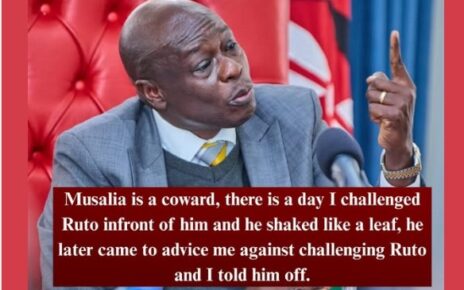Veteran politician George Natembeya has sent strong signals from Western Kenya regarding the region’s political stance toward President William Ruto. In a bold statement, Natembeya emphasized that the region will not automatically align with the President in political matters, signaling a growing assertion of regional autonomy.
Speaking publicly, Natembeya stated:
“Sisi Western Kenya tumeamua kuwa kila kitu enye inahusu William Ruto hatutaki, ndio maana tumesema ‘TAWE’.”
By using the term “TAWE,” Natembeya clearly communicated a firm rejection of being dictated to in matters concerning President Ruto. His remarks come amid a politically charged period, as leaders and communities across Kenya prepare for the upcoming elections and make strategic decisions on alliances, endorsements, and voter mobilization.
Analysts note that Natembeya’s statement reflects broader trends of regional assertion in Kenyan politics. Western Kenya, traditionally a politically active and influential region, has increasingly sought to define its stance independently, rather than automatically following national leadership figures. By distancing themselves from Ruto, local leaders like Natembeya are emphasizing the power of regional voices and the importance of local considerations in national political decisions.
The declaration also underscores potential implications for upcoming electoral contests. Western Kenya’s rejection of Ruto could affect voter alignment, party strategies, and coalition dynamics, particularly as politicians weigh the influence of local leaders on grassroots support. Natembeya’s remarks send a strong message that political loyalty in the region is earned and cannot be assumed.
Observers also point out that statements like this reflect the historical political identity of Western Kenya, where leaders have frequently asserted independence from centralized political authority. Natembeya’s “TAWE” declaration reinforces the notion that the region seeks to protect its political interests and prioritize local priorities in national governance.
Ultimately, Natembeya’s comments are a clear signal that Western Kenya will approach national politics with caution and autonomy, challenging assumptions that the region will automatically align with President Ruto’s political agenda. The declaration is likely to shape political conversations, voter expectations, and campaign strategies in the months leading to the next election cycle.



